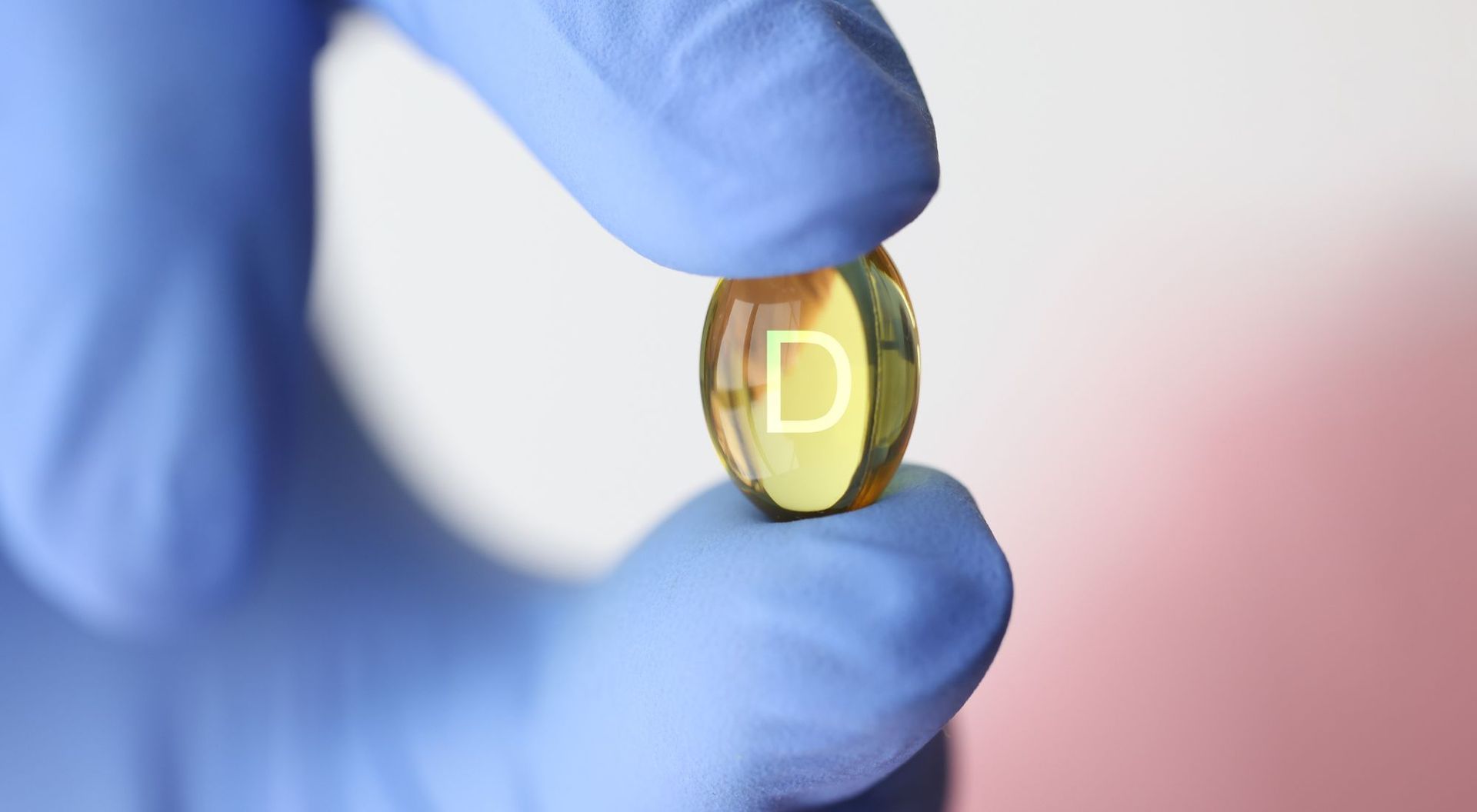Does Hashimoto’s Cause Vitamin D Deficiency? Exploring the Relationship Between the Thyroid and Avitaminosis
"The content below is not intended to be a substitute for professional medical advice, diagnosis, or treatment. Always seek the advice of your physician or other qualified health provider with any questions you may have regarding a medical condition."
If you have trouble sleeping, frequently feel fatigued, or get sick easily, you may be suffering from a vitamin D deficiency. And if you also have Hashimoto’s disease, you may be wondering if the two are linked.
Does Hashimoto’s cause vitamin D deficiency?
Being able to answer that question may help you better manage the disease and your symptoms, resulting in a better quality of life.
Though the verdict is still out on whether Hashimoto’s can cause a decrease in vitamin D in the body, science has a lot to say about the topic.
In this guide, we’ll share some of the scientific information that may help to unveil the mystery — or at least point us in the right direction of where to find the answers. Plus, learn other causes of vitamin D deficiency and ways you can boost your vitamin D intake in a natural way.
Table of Contents
What Is Avitaminosis?
Avitaminosis refers to the lack of recommended levels of one or more essential vitamins. Avitaminosis may be caused by malnutrition or not having access to foods with certain vitamins.
Lacking specific vitamins can result in a host of diseases like:
- Pellagra, due to a niacin or vitamin B3 deficiency
- Beriberi, due to a vitamin B1 deficiency
- Scurvy, due to a vitamin C or ascorbic acid deficiency
- Rickets, due to a vitamin D deficiency
- Night blindness, due to a vitamin A deficiency
- And more
Does Hashimoto’s Cause Vitamin D Deficiency?
There is much speculation in the scientific community on this subject. It's hard to say with certainty that Hashimoto’s causes vitamin D deficiencies, though there does seem to be some sort of a connection between the two.
Numerous studies have been done that demonstrate a link between thyroid disease and vitamin D deficiency, including the following:
- In this study of almost 8,000 participants, nearly 25.6% of hypothyroid patients had low vitamin D levels compared to 20.6% of those in the normal control group.
- According to the study, “Vitamin D Deficiency and Its Association with Thyroid Disease,” patients with Hashimoto’s thyroiditis reported lower levels of vitamin D.
- Another study compared vitamin D levels in patients with immune and non-immune Hashimoto’s thyroiditis (HT) and found “a significantly lower level of vitamin D” in them both. The researchers observed a “direct correlation of vitamin D with TSH levels … in HT patients” and concluded that both “non-autoimmune hypothyroidism, as well as HT, is associated with vitamin D deficiency.”
Though there seems to be a correlation between Hashimoto’s and vitamin D deficiency, what the exact correlation is — and whether one of them causes the other — is still inconclusive.
Those in the scientific community would agree that more research still needs to be done to determine the exact role of vitamin D deficiency in Hashimoto’s disease.
What Causes Vitamin D Deficiency in Hashimoto’s Patients?
Patients diagnosed with Hashimoto’s disease may not only be deficient in vitamin D, but they may also suffer from deficiencies in:
- Selenium
- Vitamin B12
- Iron
- Magnesium
- Zinc
- And more
Some causes of vitamin D deficiency in Hashimoto’s patients may include the following explanations:
- Fat malabsorption, deficient digestive enzymes, and deficient thyroid hormone levels may result in the inability to break down nutrients from our food.
- Low levels or depletion of stomach acid can result in low nutrient absorption in the intestine.
- Insufficient iodine consumption can cause an increase in the production of thyroglobulin (Tg), which can lead to an enlarged thyroid gland (goiter) or hypothyroid conditions.
- Too much iodine consumption can lead to Hashimoto’s disease because Tg reacts to excessive iodine by making more immunity antibodies.
What Are the Symptoms of Vitamin D Deficiency?
Though many people with vitamin D deficiency don’t display any symptoms, others may experience symptoms like:
- Fatigue
- Mood changes
- Joint pain
- Muscle weakness and aches
- Bone loss
- Trouble sleeping
- Hair loss
- Loss of appetite
- Pale skin
- Lower immunity (getting sick easily)
If you are experiencing these symptoms, it may be a good idea to visit your doctor. They can order blood tests to check your vitamin D levels and may also test your thyroid hormone levels as well.
Then visit Dr. Sergi at HealthierU to learn how nutrition and lifestyle changes can help you manage thyroid and low vitamin D symptoms and experience better overall health.
Risks Associated With Vitamin D Deficiency
Studies indicate that patients with Hashimoto’s thyroiditis have lower vitamin D levels than control groups. One study in particular found that 96% of Hashimoto’s patients had a deficiency in vitamin D.
Patients with thyroid disorders who lack a sufficient amount of vitamin D may also be at
risk of:
- Chronic hypocalcemia
- Hyperparathyroidism
- Osteoporosis
- Fragility fractures
- Thin or brittle bones
8 Effective Ways To Combat Vitamin D Deficiency in Hashimoto’s
Hashimoto’s patients aren’t the only ones suffering from low levels of vitamin D. Roughly one billion people worldwide are deficient in vitamin D, while in the US alone, 50% of children between the ages of one and five, 70% of children between the ages of six and eleven, and 42% of adults lack sufficient amounts of vitamin D.
So, how much vitamin D should we get per day?
The National Institutes of Health recommended the following daily amounts of vitamin D:
- Infants up to 12 months – 400 IU
- Children 1 to 13 years – 600 IU
- Teens 14 to 18 years – 600 IU
- Adults 19 to 70 years – 600 IU
- Adults over 70 years – 800 IU
It is possible to get too much vitamin D from supplements, which can result in:
- Nausea
- Vomiting
- Muscle weakness
- Confusion
- Loss of appetite
- Dehydration
- And more
To avoid excessive levels of vitamin D, pay careful attention to dosage amounts and stay under the following upper limits:
- Infants up to 6 months – 1,000 IU
- Infants from 6 to 12 months – 1,500 IU
- Children 1 to 3 years – 2,500 IU
- Children 4 to 8 years – 3,000 IU
- Children 9 to 18 years – 4,000 IU
- Adults 19 and over – 4,000 IU
To get an adequate amount of vitamin D, we’ve compiled a list of eight ways to get the vitamin D you need.
At HealthierU, we work to alleviate your health-related issues with natural remedies. Nutrition is a significant part of natural healing, and Dr. Sergi will work with you to create a nutrition plan customized to your specific health needs.
Contact us today for a nutrition consultation.
#1: Get More Sunlight
Our bodies make vitamin D when our skin is exposed to the sun, so get outside on a sunny day and soak in some of the warm sunshine — with proper sunscreen protection, of course.
One study found that just 30 minutes of sun exposure during the middle of the day was equal to 10,000 to 20,000 IUs of vitamin D, way more than the daily recommended levels.
No need to worry about excessive vitamin D levels from the sun, though, because your skin limits the amount of vitamin D it makes.
#2: Consume More Fatty Fish
Fatty fish are an excellent food source of vitamin D. Try these fish options (3.5-ounce serving) to get optimal amounts of vitamin D in your diet:
- Salmon – 563 IU
- Herring – 168 IU
- Sardines – 192 IU
- Mackerel – 552 IU
- Swordfish – 558 IU
#3: Up Your Intake of Fortified Foods
Breakfast is a great meal to get a head start on your vitamin D intake when you consume food fortified with vitamin D.
Though they won’t pack in as much vitamin D as the fatty fish above, the following fortified foods can certainly help you get to the recommended daily amount:
- Orange juice – 33 IU
- Eggs – 44 IU
- Skim milk – 107 IU
- Yogurt – 60 to 88 IU
#4: Munch on More Mushrooms
Mushrooms are the only non-animal food source of vitamin D2 (animal products produce vitamin D3).
A little more than one cup of mushrooms (100 grams) provides 8 IU of vitamin D, and some mushrooms can have increased amounts of vitamin D when exposed to ultraviolet light.
Even though the vitamin D amounts in mushrooms are fairly small, mushrooms are low in calories and fat, so eating several servings can help you reach your daily dose.
#5: Take Supplements
Supplementing your diet with vitamin D is easy with multivitamins, supplements with vitamin D and other nutrients (Omega-3s combined with vitamin D, for example), or vitamin D-only dietary supplements.
Vitamin D supplements are found in two forms — vitamin D2 and vitamin D3.
Vitamin D is a fat-soluble vitamin, so taking it with a meal may help your body absorb it better.
There are risks associated with taking too much vitamin D, so if you take more than 2,000 IU of vitamin D a day, it’s a good idea to regularly check your vitamin D levels to make sure you are in a healthy range.
#6: Try a UV Lamp
UV lamps emit UV rays similar to the sun and produce vitamin D3 in the skin. These “sun lamps” can be a nice substitute for the real thing during the winter months or on cloudy days.
Since UV rays have been known to increase the
risk of skin cancer, you may want to limit your use of these lamps and focus on getting most of your vitamin D from the other seven sources mentioned here.
#7: Exercise Daily
According to this
Harvard study, those who exercised “vigorously” (running, jogging, playing soccer, etc.) had higher levels of vitamin D.
And when you pair exercise with an outdoor activity, you’re getting a double dose.
#8: Avoid Inflammatory Foods
Inflammation is linked to all sorts of ailments and diseases, and studies have found there may be a link between vitamin D deficiency and inflammation as well. It’s uncertain what the exact link is — whether a vitamin D deficiency contributes to inflammatory diseases or if vitamin D is an effect of the inflammatory disease.
Either way, eating inflammatory foods may affect vitamin D absorption (due to the gastric issues mentioned above), so if your vitamin D levels are low, it’s best to avoid inflammatory foods like:
- Red meat
- Processed meat
- Bread and pasta
- Deep-fried foods
- Sugary beverages
- Trans fats
Fight Against Hashimoto’s and Vitamin D Deficiency Through Nutrition and the Help of HealthierU
If you’ve been diagnosed with Hashimoto’s disease and vitamin D deficiency, Dr. Donna Sergi at HealthierU can help with individualized nutrition and supplement plans.
As a natural nutritionist, Dr. Sergi believes in natural healing — getting to the root issues rather than treating the symptoms.
With a personalized approach, she takes the time to get to know each of her patients to help customize a nutrition and lifestyle program suited to each person’s health issues and needs.
Dr. Sergi treats patients with a variety of symptoms, including digestive health, hormonal imbalance, and thyroid dysfunction.
At HeathierU, we are committed to helping our patients get well and stay well naturally. Visit us for a
free consultation and get on the road to a naturally healthier you!






